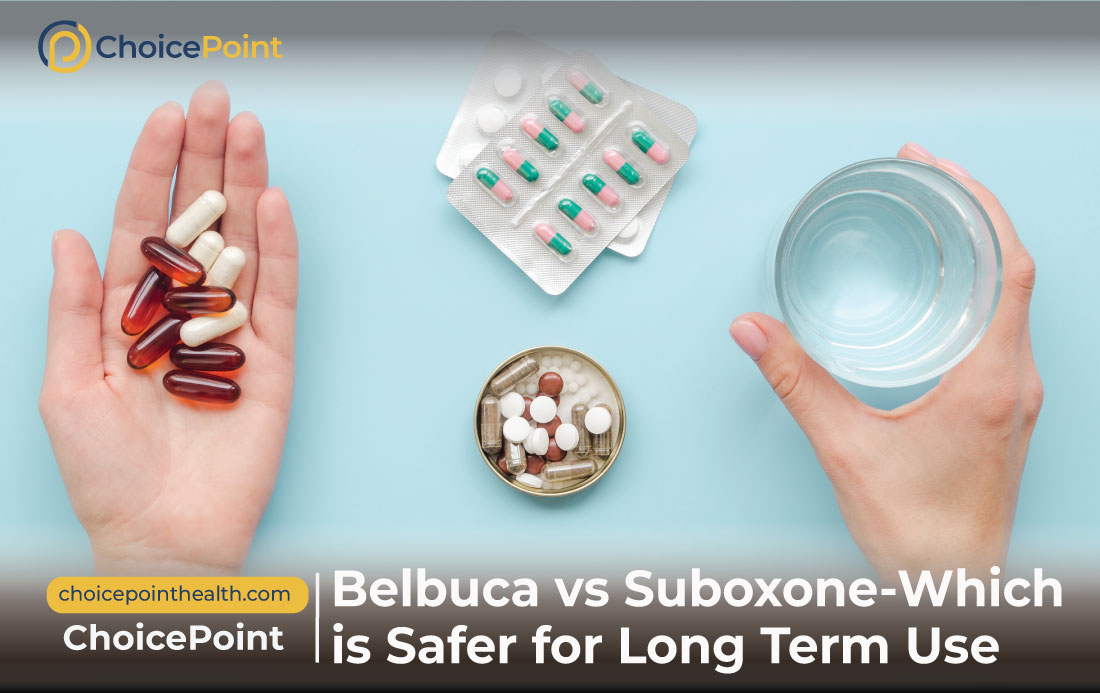Opioids like heroin and fentanyl are amongst the most highly abused opioids globally. They are highly addictive and equally damaging to mental and physical health. Addiction to these opioids is very difficult to tackle. However, with prescribed medication, treatment is possible. Belbuca and Suboxone are effective medications against opioid addiction. They both come with some side effects, pros and cons. In this article, we will discuss the benefits, dangers, and effectiveness of Belbuca vs Suboxone and comment on the safer option for long-term use.
ChoicePoints offers FDA-approved medications and behavioral therapies during the MAT program. For information on beginning addiction treatment at ChoicePoint, call us at 844.445.2563.
Table of Contents
Belbuca 300mg vs Suboxone 8mg- Can Help To Beat Opioid Dependence
Belbuca vs Suboxone is highly regarded as an effective medication against opioid dependence and can be legally acquired with a doctor’s prescription. Belbuca and Suboxone belong to a class of drugs called opioid agonists and opioid antagonists. Opioid antagonists help with;
- Reducing opioid dependence
- Managing withdrawal effects
- Overdose reversal
- Treatment for opioid addiction
Belbuca 300 mcg vs Suboxone 8mg is commonly used to treat opioid use disorder. However, they contain different active ingredients and have some distinct characteristics. If you wish to speak directly with an addiction specialist regarding the MAT program, call ChoicePoint at 844.445.2563.
How Belbuca Helps To Beat Opioid Dependence
The main ingredient of Belbuca is Buprenorphine. Here is how Belbuca treats opioid dependence:
1. Manages Withdrawal Symptoms
Belbuca helps alleviate withdrawal symptoms such as:
- cravings
- muscle aches
- nausea
- anxiety
Belbuca is a partial opioid agonist. Meaning that although they bind to the same brain receptors as opioids, they do not produce similar intense effects
2. Opioid Agonist
If an individual were to take other opioids while on Belbuca, they would have reduced effects. This discourages misuse and minimizes the risk of overdose.
3. Stabilizes Brain Chemistry
Opioids can destroy brain chemistry. Belbuca can help stabilize it. This helps to normalize the functioning of the brain’s opioid receptors.
4. Longer Effect
Belbuca may offer a long duration of action. Individuals can remain focused on recovery without frequent dosages by providing sustained relief from withdrawal symptoms and cravings.
5. Complements Other Treatment Programs
Belbuca can be easily included as a part of a comprehensive treatment program. This includes therapy and support.
Are you thinking about getting help for your Opioid Use Disorder? Call us at 844.445.2563 and let our doctors help you!
How Suboxone Helps Beat Opioid Dependence
Suboxone is relatively considered a more effective medication for treating Opioid addiction. Its ingredients include buprenorphine and naloxone. The substance acts as a complete opioid antagonist.
Here’s how Suboxone beats opioid addiction:
1. Reduces Withdrawal Symptoms
Withdrawing from opioids may be hard. Most users fail to quit because of intense withdrawal effects. Buprenorphine and naloxone both help against withdrawal symptoms.
2. Blocks the Effects of Other Opioids
Naloxone, an opioid antagonist, is especially included in Suboxone to tackle misuse. When Suboxone is taken as prescribed, the naloxone has minimal effect. However, if someone tries to misuse it by injecting it, the Naloxone becomes active. This avoids the potential for misuse and reduces the risk of overdose.
3. Minimizes Cravings
Suboxone connects to brain receptors and helps reduce cravings.
4. Prevents Euphoria from Other Opioids
Suboxone blocks the euphoric effects of other opioids. By reducing their attractiveness, individuals can avoid relapse.
5. Long Half-Life
Suboxone has a long half-life, meaning it remains active in the body for an extended period.
6. Effective Long-term Treatment Option
Not only does the medication reduce cravings, but it also treats symptoms. This makes Suboxone an excellent long-term treatment. It can also be assisted with other treatments such as therapy, etc.
7. Reduce Drug-Seeking Behaviour
Suboxone helps stabilize brain chemistry. It can reduce intense cravings and compulsive drug-seeking behavior.
If you or someone you know is struggling with Opioid addiction, don’t hesitate to contact ChoicePoint, where professional DEA-certified practitioners offer an Online MAT program and same-day prescriptions. Call us now at 844.445.2563.

Is Belbuca The Same As Suboxone?
Dangers Associated with Belbuca Use
Belbuca, like other opioids, may cause respiratory depression. This is more likely to happen when consumed in higher doses or combined with other medications. Here are some other potential dangers of using Belbuca:
A. Potential for Misuse
Belbuca has the potential for misuse, especially if overdosed. Abuse may also lead to dependence and health issues.
B. Sedation and Drowsiness
Belbuca may cause drowsiness and impair cognitive and motor functions.
C. Constipation
Belbuca may also cause constipation. This can be avoided with proper hydration and diet.
D. Dependence
Prolonged use of Belbuca can lead to physical dependence. The medication should be gradually withdrawn under medical supervision to minimize withdrawal discomfort.
Dangers Associated with Suboxone Use
As established earlier, Suboxone is a safe medication when used as advised by doctors. However, misuse of any medication may lead to negative effects. Some common dangers of using Suboxone without a doctor’s supervision include:
A. Risk of Respiratory Depression
Suboxone may cause slowed breathing and is dangerous if not taken as prescribed or combined with other substances, such as alcohol.
B. Potential for Misuse
Suboxone can still be misused, especially if taken in higher doses, injected, or without a doctor’s consultation.
C. Withdrawal Symptoms Upon Abrupt Discontinuation
If Suboxone is stopped suddenly without proper medical guidance, it can lead to withdrawal symptoms.
D. Side Effects
Common side effects of Suboxone include constipation, nausea, headaches, insomnia, and sweating. These side effects should be reported to a doctor if they become severe.
E. Interactions With Other Medications
Suboxone can interact with certain medications, such as sedatives, antidepressants, or antipsychotics. These interactions can lead to adverse effects or reduced effectiveness.
It is time to take the first step towards a healthier, addiction-free life by seeking help from ChoicePoint. We provide a comprehensive online MAT program and support tailored to your unique needs. To schedule an appointment, call now at 844.445.2563.
Belbuca vs Suboxone- Which is Safer for Long-Term Use
Both Belbuca and Suboxone can be used for opioid addiction. Both are effective and safe when used as prescribed by the doctor. However, Suboxone includes Naloxone, which, as an opioid antagonist, can block the effects of other opioids. This makes it much safer and less likely to be abused in the long run. So, if you are struggling with Opioid addiction and looking for an effective FDA-approved medication, you may choose Suboxone, but not without proper consultation from an addiction specialist.
It is crucial to consult a qualified healthcare provider to determine which medication suits an individual’s needs. Call ChoicePoint at 844.445.2563 to schedule an in-person or phone consultation with our DEA-certified addiction specialists today!
Critical Questions Regarding Belbuca vs Suboxone
Here are some critical questions and considerations when comparing the two:
1. How is Belbuca different from Suboxone?
Suboxone is used to treat opioid use disorder, while Belbuca is used to alleviate pain. Suboxone contains Naloxone to prevent overuse, but Belbuca does not. Belbuca has much lower buprenorphine dosages than Suboxone.
2. What are the advantages of prescribing Buprenorphine rather than Methadone?
The “ceiling effect” of buprenorphine reduces the risk of abuse and side effects, making it safer than methadone for mild to severe opioid use disorders. However, the limited effects beyond a specific level make it less beneficial for persons with heavy opioid usage.
3. Are Belbuca and Suboxone used alongside counseling and therapy in Medication-Assisted Treatment (MAT) programs?
Yes, both Belbuca and Suboxone are utilized in MAT programs, complemented by counseling and therapy sessions.
4. What is the primary purpose of Belbuca and Suboxone?
Belbuca is primarily prescribed for severe pain management, while Suboxone is specifically used for opioid addiction treatment and maintenance therapy.
5. Can Belbuca replace Suboxone?
Both Belbuca and Suboxone include Buprenorphine. However, they are used for distinct purposes. Belbuca is only licensed by the FDA for chronic pain, not for treating opioid use disorder (OUD) like Suboxone. Taking prescribed drugs exactly as indicated is critical because they are not interchangeable.
6. What is special about Suboxone?
Suboxone was created to combat opioid addiction; the medication was designed to have a much lower risk of reliance than methadone. Furthermore, the negative effects of Suboxone are frequently milder and more physical than mental.
Medical Disclaimer:
ChoicePoint aims to improve the quality of life for people struggling with substance use disorder and mental health issues. Our team of licensed medical professionals research, edit and review the content before publishing. However, this information is not intended to be a substitute for professional medical advice, diagnosis, or treatment. For medical advice please consult your physicians or ChoicePoint's qualified staff.











Review Belbuca VS Suboxone- Which is Safer for Long Term Use.